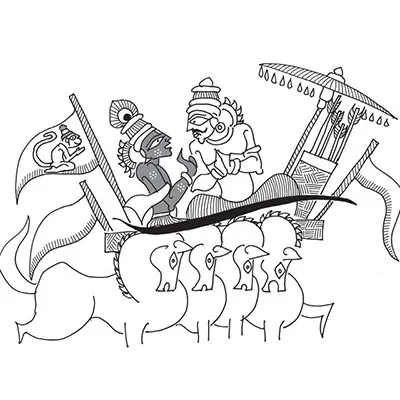Misreading Bhagavad Gita as motivation
In corporate circles, it’s common to think of the Bhagavad Gita as a motivational speech given by Krishna to Arjun, after which he fights a tough battle and wins the war. This is a half-truth and certainly not the intention of the Bhagavad Gita.
In corporate circles, it’s common to think of the Bhagavad Gita as a motivational speech given by Krishna to Arjun, after which he fights a tough battle and wins the war. This is a half-truth and certainly not the intention of the Bhagavad Gita.
Any attempt to use the Bhagavad Gita as a motivational speech for corporate success is flawed as it mis-frames the sacred narrative that exists in a very different context.

Art by Devdutt Pattanaik
Krishna is certainly not a cheerleader, motivator or trainer. In the narrative, he is God who is on Earth to establish dharma and the conversation of dharma revolves around activity—what choices you make, what decisions you take.
It is NOT based on success, which is why Krishna keeps saying that to action alone you have the right, not to results. What is dharma? Not ethics or righteousness, as westernised academicians keep telling us. Dharma is when we stop behaving as animals and display our humanity. In other words, a peace based on dehumanising fellow humans through force, like domesticating wild animals, is not desirable; it is not dharma.
Likewise, a war, where we fight as animals over a bone, is not dharma. It must be kept in mind that Arjun is going through a crisis, which prompts the narration of the Gita.
The Gita is essentially crisis management. Suddenly, Arjun’s nerves fail him and he does not find value in the violence that he meant to participate in just before the war is about to start. It is not that Arjun has a problem with violence per se—it’s a problem with violence against family members. He feels that if he fights family members, he will forever be branded a killer of relatives— and he does not want that. So, his problem is not ethical or moral. It is a very selfabsorbed goal of not wanting to be seen as a killer of relatives.
If the men before Arjun were strangers, he would have had no problem in killing them. This brings us to the idea of violence in the Bhagavad Gita.
The Bhagavad Gita is a philosophy being presented in the middle of a battleground. This is no metaphor, as Mahatma Gandhi insisted it was. It is strategic. It shows that war is sometimes part of life, even if we try our best to find peace. It tries to change our attitude or approach or understanding of war as well as peace.
A peace where dharma is not respected is not desired, just as war where dharma is not respected is not desired. Arjun is a beneficiary of his royal role and status, but when it comes to paying the price for his privilege, which means fighting for the land that has been misappropriated by his cousins, he fears his reputation will be harmed. He has to choose between royal obligation and personal reputation.
We must remember the story of Ram, who follows his royal obligation of defending royal reputation from public gossip, which unfortunately involves the horrible action of abandoning his innocent pregnant wife, Sita, in the forest, knowing fully well it is totally wrong. It scars Ram’s reputation forever, even though he demonstrates his love and fidelity for his wife by refusing to remarry.
Our roles often force us to do things that we know to be morally right or wrong, but in the Indian scheme of things, we really don’t know what is right or wrong. There are many forces at work that create context and we cannot control everything and therefore, we have to submit to the limited nature of our context.
Krishna, therefore, presents through his intellectual exposition, a larger context in which we function and where we have very little control. He also talks about how we can only kill the body but there is something timeless and immortal within our body that survives, which he calls the atma. Faith is submitting to this larger reality, which cannot be rationalised, which we cannot fully understand or control. But we do have greater control over our emotions. We can control our insecurities and be generous.
The Kauravas have chosen not to be generous. By refusing to share their fortune, in excluding their own cousins, they have stopped behaving like humans and chosen to behave like wild territorial beasts. Overpowering them is, therefore, dharma. Fighting them is important, but not hating them. How do we not hate those whom we fight? That is the challenge that the Gita throws at us.
We must realise that in the Mahabharata, at the end of the Kurukshetra war, Arjun’s children are killed. The Pandavas win the war, but lose their children. It’s not quite the success it’s made out to be—it’s a pyrrhic victory!
The speech leads to victory, but not happiness. Is that success?
The story was previously published here.
(Disclaimer: The views and opinions expressed in this article are those of the author and do not necessarily reflect the views of YourStory.)







